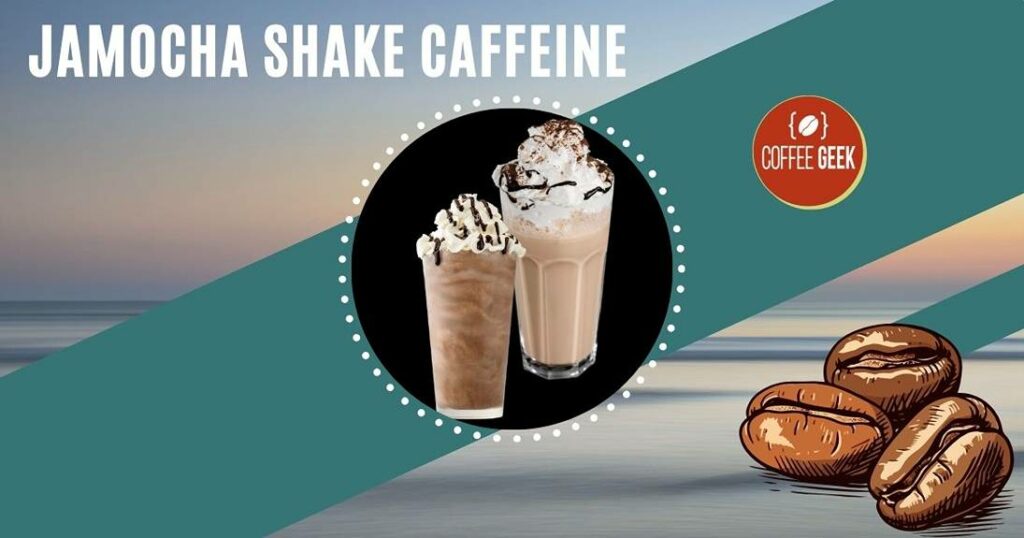Jamocha shakes have been a popular coffee and chocolate-flavored milkshake choice among dessert lovers for decades.
Arby’s Jamocha Shake, in particular, is well-known among fans of the fast-food restaurant.
You might be wondering about the caffeine content of these shakes and how they compare to other caffeinated beverages, especially if you are someone who wants to keep track of your daily caffeine intake.
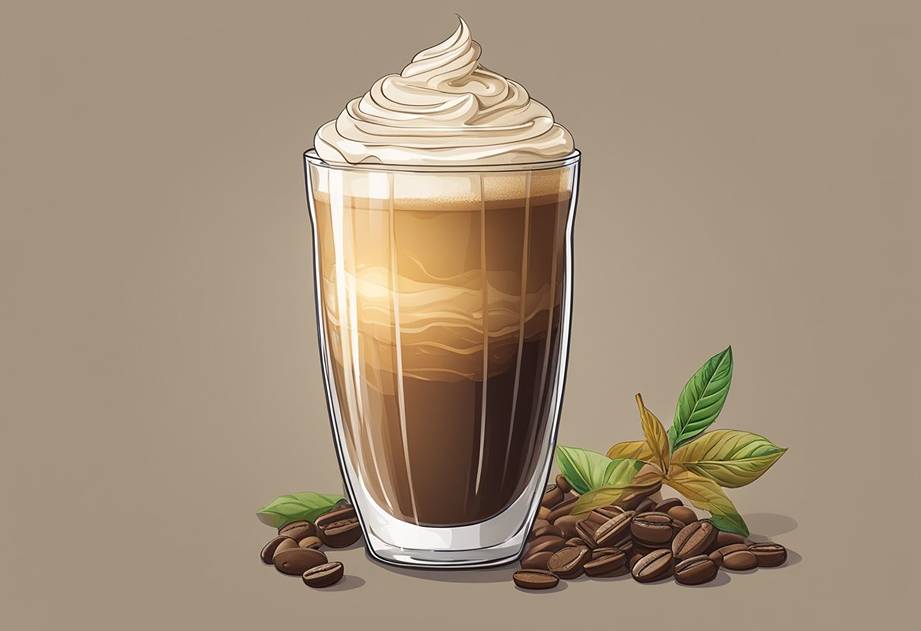
Before diving deeper into the topic, it’s essential to understand that the Jamocha shake caffeine content largely depends on the specific brand or recipe being used.
In the case of Arby’s Jamocha Shake, the caffeine level is surprisingly quite low.
The drink uses instant coffee powder rather than concentrated brewed coffee in its Jamocha syrup, causing the shake to have significantly lesser caffeine compared to other common coffee beverages.
Key Takeaways
- Jamocha shakes are a popular coffee and chocolate-flavored milkshake with varying caffeine levels based on the brand or recipe used
- Arby’s Jamocha Shake contains a relatively low amount of caffeine due to the use of instant coffee powder instead of concentrated brewed coffee
- Ensure to keep track of your daily caffeine intake since the content in Jamocha shakes varies, especially if monitoring your caffeine consumption is essential for your lifestyle and health goals
Jamocha Shake Overview
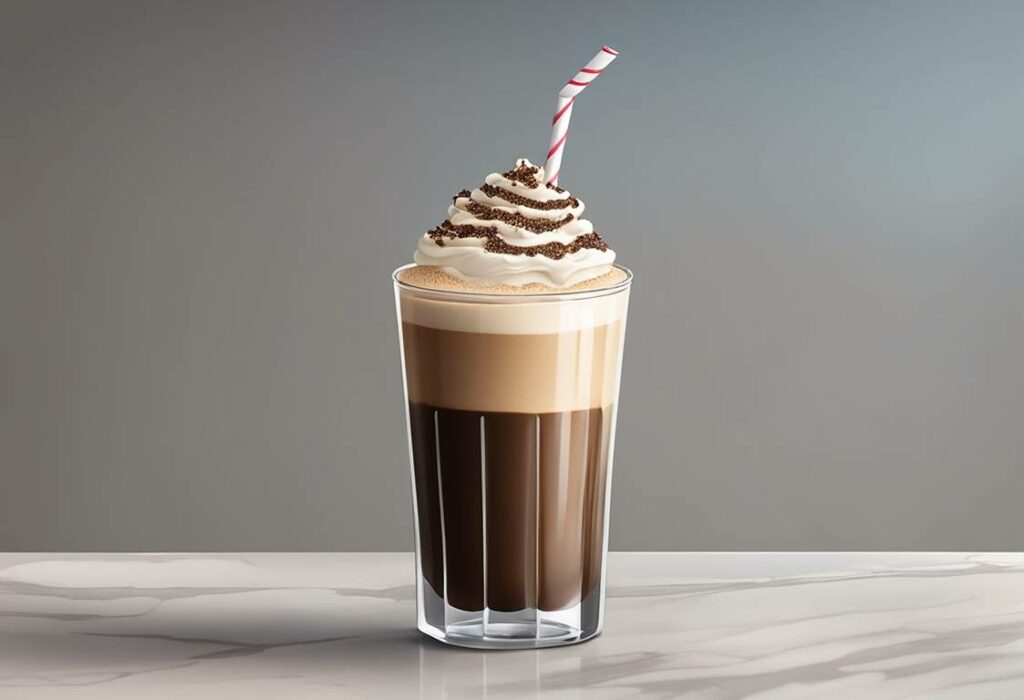
What is a Jamocha Shake?
A Jamocha Shake is a delicious and creamy beverage that combines the rich flavors of coffee and chocolate to create an indulgent treat.
This shake mix usually contains a base of ice cream or a similar frozen dairy product, blended with instant coffee powder and cocoa or chocolate syrup. It often has a distinct coffee flavoring that sets it apart from a typical mocha beverage.
You can enjoy this unique drink at certain fast-food chains, like Arby’s, or even make your own at home using a few simple ingredients.
Historical Origin and Popularity
The origin of the Jamocha Shake can be traced back to the combination of jamocha, which is an Americanized version of the word mocha, and the fusion of coffee and chocolate flavors.
While mocha beverages have been enjoyed for centuries, the Jamocha Shake specifically gained popularity in the United States during the mid-20th century as a fast-food innovation, creating a new twist on the classic iced coffee variations.
Its name and flavor have cemented it as a popular choice among coffee and dessert lovers alike.
Jamocha Flavor Profile
Despite the similarities between mocha and Jamocha shakes, there are subtle differences in their flavor profiles.
A Jamocha shake has a bolder, more distinct coffee flavor in contrast to a traditional mocha, which tends to have a slightly milder and creamier taste due to the balance between coffee and chocolate.
The use of instant coffee powder in a Jamocha shake, instead of brewed coffee, contributes to its unique taste.
Through the combination of its rich chocolate and aromatic coffee flavors, you can expect a Jamocha Shake to deliver a satisfying and delectable beverage experience.
Jamocha Shake Caffeine Level
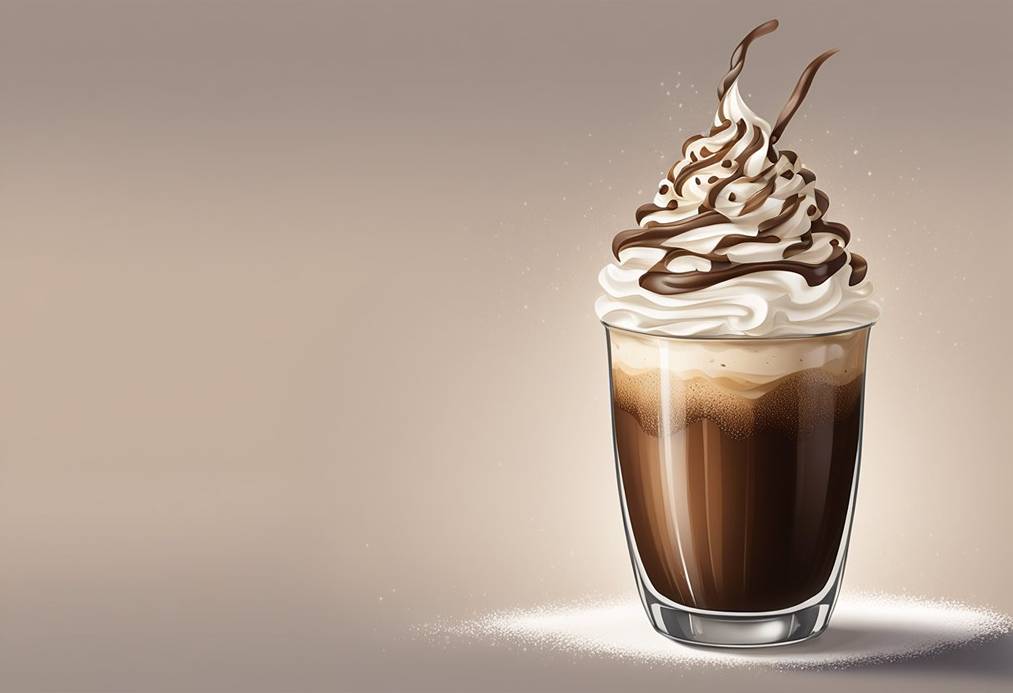
Comparing Caffeine Levels
When it comes to caffeine content, Arby’s Jamocha Shake is on the lower end of the spectrum.
With just 11.6 mg of caffeine in a 16-ounce serving, this shake offers a small amount of energy boost compared to other popular coffee beverages.
Here’s a comparison of caffeine levels in common coffee-based drinks:
- Starbucks White Chocolate Mocha (16-ounce) – 150 mg of caffeine
- Dunkin Donuts Iced Coffee (16-ounce) – 237 mg of caffeine
- McDonalds Iced Coffee (16-ounce) – 250 mg of caffeine
- Arby’s Jamocha Shake (16-ounce) – 11.6 mg of caffeine
Although the Jamocha shake’s caffeine level is relatively low, it is still present.
The shake’s caffeine content may slightly vary by size and is derived from instant coffee powder used in their Jamocha syrup rather than brewed coffee.
Caffeine and Health Considerations
In moderation, caffeine can provide several health benefits, including improved cognitive function, increased alertness, and a slight mood boost.
However, excessive caffeine intake can lead to unwanted side effects, such as increased heart rate, insomnia, and nervousness.
With its low caffeine content, a Jamocha Shake is a suitable choice if you’re looking for a coffee-flavored treat without the full energy spike that comes with a typical coffee-based beverage.
But keep in mind that the Jamocha Shake also has a high sugar and calorie content, so always enjoy it in moderation as part of a balanced diet.
In summary, a Jamocha Shake offers a mild caffeine boost without reaching the high levels found in other coffee drinks.
Though low in caffeine, remember that it is still a treat with high sugar and calories, so consume it responsibly and enjoy the delicious taste and texture of a Jamocha Shake.
Nutritional Content
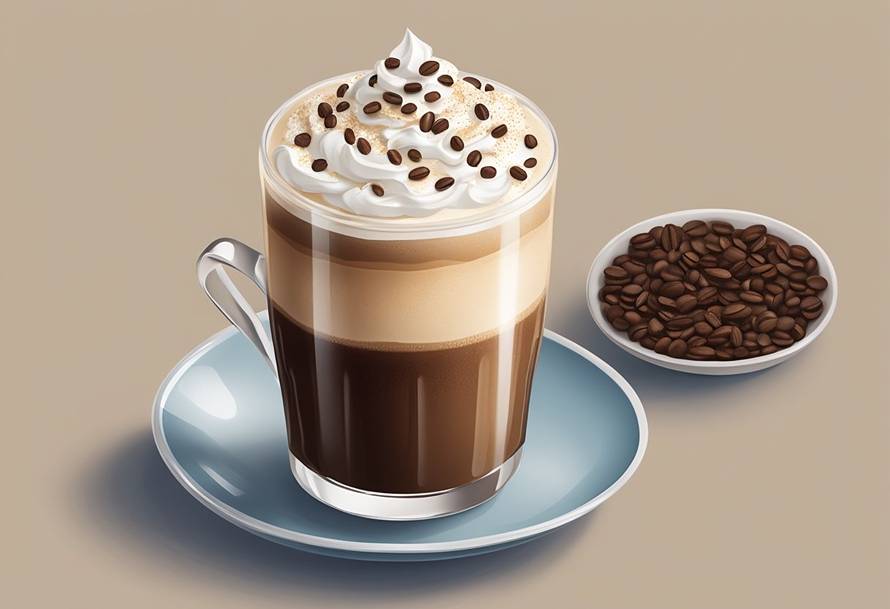
Caloric Value
Arby’s Jamocha Shakes come in different sizes, and their calorie content varies accordingly. A small Jamocha shake has 440 calories, while a large Jamocha Shake contains 1030 calories.
You might consider ordering a Snack/Kids Jamocha Shake if you wish to consume fewer calories, as they total 340.
Keep in mind that most of the calories in these shakes come from carbohydrates.
Sugar and Carbohydrates
Sugar is an essential aspect of Jamocha Shake’s nutritional profile. An Arby’s medium-sized Jamocha Shake contains a staggering 116 grams of sugar, which is quite high considering the daily recommended intake.
In terms of total carbohydrates, a small shake carries 66% of them, predominantly in the form of sugar.
When consuming these shakes, it’s important to remember that they contain high fructose corn syrup and corn syrup, contributing to the high sugar content.
While the shakes have trace amounts of dietary fiber, it may not be enough to counteract the hefty sugar content.
Proteins and Fats
Jamocha Shakes also offer some proteins and fats, contributing to their rich, creamy texture and taste.
The small Jamocha Shake has 8 grams of protein while the large shake sports 24 grams.
When considering fats, the small size offers about 8 grams and the large about 31 grams.
Some of these are saturated fats, so it’s essential for you to moderate your intake of the shakes, ensuring they fit into your daily nutritional goals.
Lastly, the shakes do contain sodium and potassium, both essential to your bodily functions.
However, it’s crucial to balance these nutrient intakes with your daily recommended values to maintain your overall health.
Ingredients and Preparation
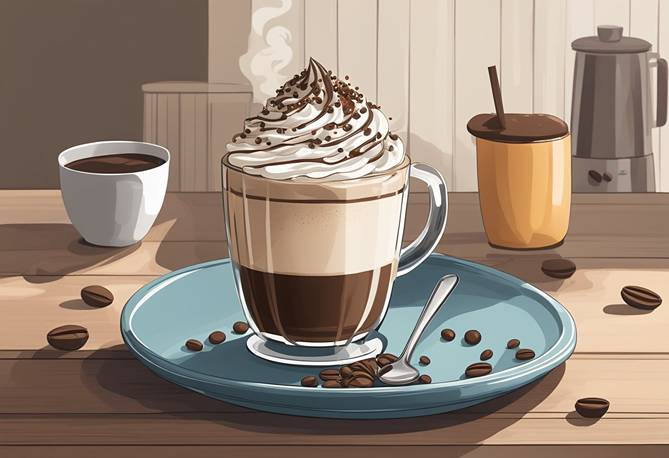
Key Ingredients
To create a delicious Jamocha Shake, you will need the following key ingredients: instant coffee, whole milk, sugar, ice cream (preferably vanilla), and chocolate syrup.
Some variations of the recipe may also include cocoa powder or whipped cream as an optional topping.
Making a Jamocha Shake at Home
Creating a Jamocha Shake at home is quite simple.
Here is a brief step-by-step guide to help you along:
- Combine the instant coffee with whole milk and sugar in a blender. Blend at medium speed for about 15 seconds until the mixture is smooth.
- Add in the ice cream and chocolate syrup to the blender. Continue blending until the shake is creamy and well combined.
- Optionally, you can top off your homemade Jamocha Shake with a dollop of whipped cream and a drizzle of chocolate syrup.
*Note: Adjust the quantities of instant coffee, milk, and sugar according to your taste preferences.
Commercial Variations
Commercial Jamocha Shakes, such as the one from Arby’s, may use a pre-made Jamocha syrup in their recipes.
This syrup may contain a mix of coffee and cocoa flavors, as well as additional sweeteners.
Keep in mind that the caffeine content of a commercial Jamocha Shake may vary.
For instance, Arby’s Jamocha Shake is reported to have approximately 0.72 mg of caffeine per fl oz, or 2.45 mg per 100 ml.
Now that you have all the necessary information, go ahead and enjoy your homemade Jamocha Shake!
Flavor Variations and Pairings
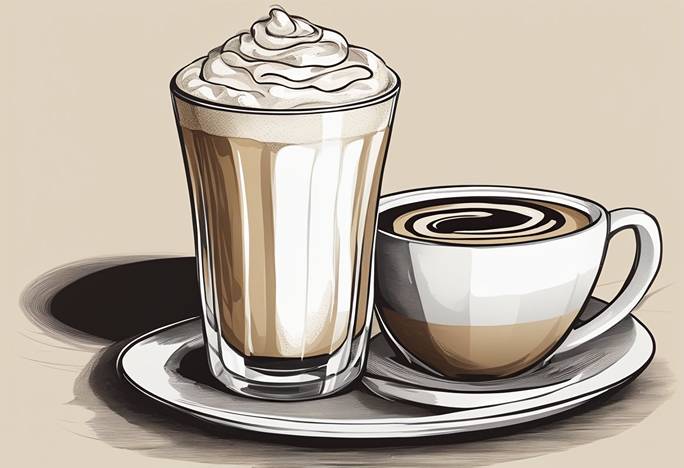
Customizing Your Jamocha Shake
When it comes to customizing your Jamocha Shake, there are plenty of ingredients you can add to enhance the flavors or make it more visually appealing.
If you’re a fan of warm spices, a pinch of cinnamon or nutmeg could add an interesting twist to your shake.
To elevate the taste and texture, ghirardelli chocolate drizzle and whipped topping can be incorporated, giving the Jamocha Shake a more luxurious finish.
Those who prefer a touch of whimsy may opt for sprinkles that add both color and texture.
Furthermore, you can experiment with different levels of caramel color to achieve your desired visual effect.
Some possible customizations include:
- Adding cinnamon or nutmeg for a warm spice note
- Using ghirardelli chocolate drizzle and whipped topping for a luxurious finish
- Incorporating sprinkles for a fun touch
- Adjusting caramel color to suit your preference
Complementary Food Items
Pairing your Arby’s Jamocha Shake with the right food can make for a delightful meal or snack experience.
The Jamocha Shake’s rich coffee and chocolate flavors make it particularly suitable to complement a variety of sweet and savory menu items.
For instance, enhance your shake experience with a classic Arby’s roast beef sandwich, as the savory notes of the sandwich balance well with the sweet and caffeine-infused shake.
Alternatively, if you’re craving something sweeter, pair it with a chocolate chip cookie or apple turnover for a harmonious combination of flavors.
Here are some suggested pairings for your Jamocha Shake:
- Classic Arby’s roast beef sandwich
- Chocolate chip cookie
- Apple turnover
By customizing your Jamocha Shake and selecting the perfect food pairings, you can create a satisfying and indulgent experience.
Remember to be creative and have fun while exploring different variations and combinations.
Serving Sizes and Packaging
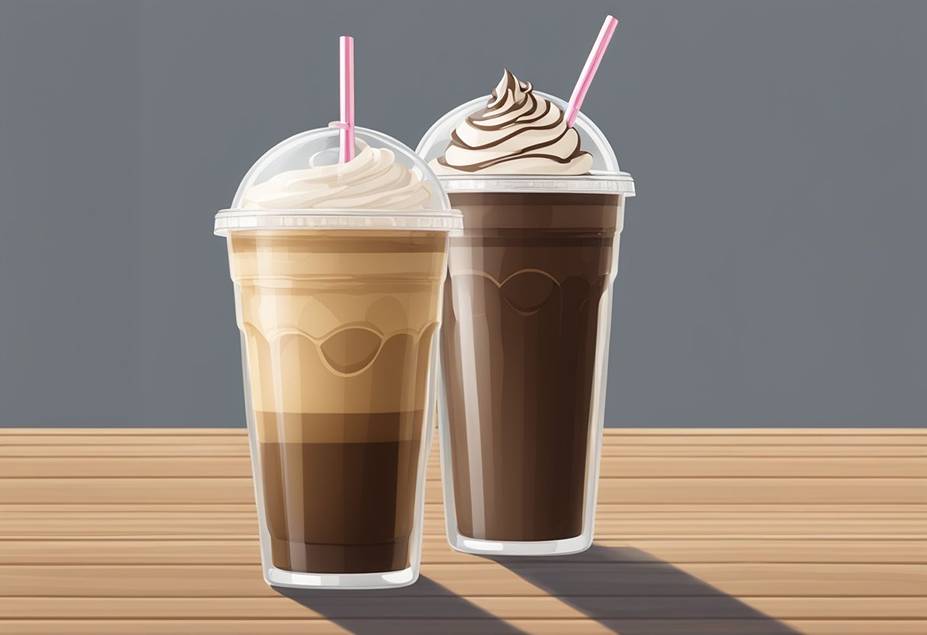
Standard Serving Dimensions
When you order Arby’s Jamocha Shake, it comes in three different sizes to cater to your preferences: small, medium, and large.
The small size is served in a 12 fl oz cup, the medium in a 16 fl oz cup, and the large in a 22 fl oz cup.
To put it into perspective, here is a list of the sizes and their corresponding volume:
- Small: 12 fl oz or 354 ml
- Medium: 16 fl oz or 473 ml
- Large: 22 fl oz or 650 ml
It is essential to understand the caffeine content per serving since a Jamocha Shake does contain calcium.
A 16 fl oz cup of Arby’s Jamocha Shake contains approximately 11.6 mg of caffeine.
This translates to about 0.72 mg of caffeine per fl oz and around 2.45 mg of caffeine per 100 ml.
Environmental Considerations
As you enjoy your Jamocha Shake, also consider the environmental impact of the packaging.
The shake cups are generally made from single-use plastic, which contributes to waste generation.
It is your responsibility as a consumer to properly dispose of the packaging or even better, look for alternatives like reusable cups or bottles.
Legislation and Industry Standards
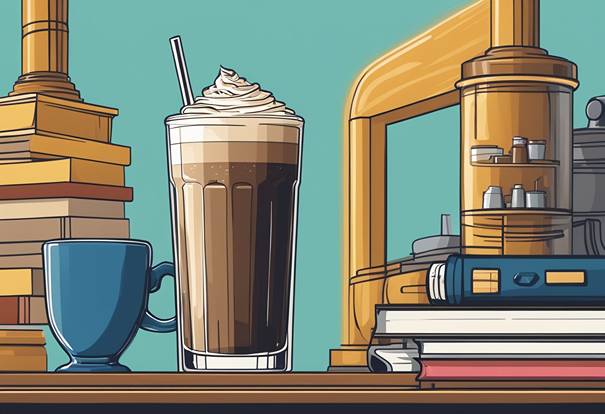
Nutritional Labeling
As a consumer, it is essential to be aware of the nutrition information provided on food labels. Nutrition facts need to comply with regulations that ensure accuracy and transparency.
In the case of a Jamocha shake, an important aspect to consider is the caffeine content.
A regular 16-ounce Arby’s Jamocha Shake contains only 11.6 mg of caffeine, which is significantly low compared to other coffee-based drinks such as a 16-ounce Starbucks White Chocolate Mocha at 150 mg of caffeine.
To understand health implications better, aside from caffeine, you should also be mindful of other nutritional components in the shake.
Note that the presence of additives like sodium citrate, sodium chloride, and sodium carbonate serves particular purposes such as preserving flavor, maintaining pH levels, and enhancing texture.
Food Quality Regulations
Food quality regulations are put in place to ensure the safety and quality of the products you consume.
Key elements of these regulations include the use of safe additives and compliance with recommended usage levels.
In a Jamocha shake, you will find common food additives such as citric acid, potassium sorbate, and sodium chloride.
Each of these serves a crucial function in the product:
- Citric acid: This is a natural acid found in citrus fruits, acting as a flavor enhancer and a preservative.
- Potassium sorbate: This preservative helps inhibit mold growth and extends the product’s shelf life.
- Sodium chloride: Commonly known as table salt, it adds flavor and may help preserve the shake.
It is crucial for Jamocha shake manufacturers to comply with relevant food safety regulations to ensure that these additives are used correctly, within recommended limits, and are safe for consumption.
By being informed about the legislation and industry standards, you can make informed decisions about the food you consume to maintain a healthy lifestyle.
Final Words
As the heat ramps up in 2024, the quest for the perfect frosty beverage to cool down on a hot summer day leads many to the beloved Jamocha Shake.
Known for its unique blend of rich coffee and chocolate flavors, this fast-food restaurant staple has caught the eye—or more aptly, the taste buds—of coffee fans everywhere.
But what about its caffeine content?
For those looking to enjoy the coffee shake without the jitters, understanding the Jamocha Shake caffeine breakdown is key.
Arby’s Jamocha Shake, a tasty treat combining coffee and chocolate, is more than just a sweet indulgence; it’s a caffeine carrier, albeit with a little caffeine compared to a standard cup of coffee.
Those who are sensitive to caffeine or who frequently reach for a cup of joe might wonder about the caffeine in Arby’s Jamocha Shake.
While it does contain caffeine, the amount is relatively low, making it a suitable option for those who want a coffee taste without the full caffeine punch.
Interested in replicating the Arby’s Jamocha Shake at home? It’s entirely possible with some coffee ice cream, natural vanilla flavor, and, if you’re a coffee expert, your preferred coffee concentrate or brew.
Feel free to use this as a base for your copycat recipe, tweaking it to match your coffee and sweetness preferences.
While homemade versions allow you to control the coffee and sugar content, remember that the original shake is high in sugar, making moderation key.
The Jamocha Shake blends several ingredients like grade
A cream, nonfat milk solids, and an array of stabilizers and thickeners—mono and diglycerides, cellulose gum, guar gum, carrageenan, and more—to achieve its creamy texture.
For those creating a copycat version, focusing on the coffee and chocolate components will capture the essence of the shake.
In summary, whether you’re visiting a fast food restaurant or whipping up a batch in your freezer, the Jamocha Shake offers a delicious way to enjoy a coffee-flavored treat on a hot summer day.
Just be mindful of the caffeine and sugar content, and remember, everything is best enjoyed in moderation.
Frequently Asked Questions
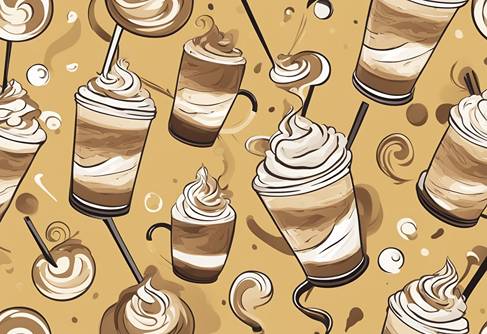
What is the caffeine content of a Jamocha Shake?
How much caffeine small Jamocha Shake contain – approximately 50-60 milligrams of caffeine, which is roughly equivalent to a small cup of brewed coffee.
The amount of caffeine can vary depending on the size and specific recipe of the shake.
How does the caffeine amount in a Jamocha Shake compare to a cup of coffee?
Jamocha Shake Caffeine content in a 16-ounce from Arby’s is around 11.6 milligrams.
This is much lower compared to other coffee beverages.
For reference, a 16-ounce Starbucks White Chocolate Mocha has 150 mg of caffeine, and a 16-ounce Dunkin Donuts Iced Coffee contains 237 mg of caffeine.
Can you find information on the caffeine levels in a Jamocha Shake via Reddit discussions?
Yes, it’s possible to find information on the caffeine levels in Jamocha Shakes through Reddit discussions.
You can search for discussions on the topic by using the Reddit search function, visiting related subreddits, or participating in discussions yourself.
However, keep in mind that information from Reddit may not always be accurate or reliable, so it’s a good idea to verify it with other sources.
What are the professional reviews saying about the caffeine in Jamocha Shakes?
Professional reviews on Jamocha Shakes generally focus on the flavor, rather than the caffeine content.
While the specific amount of caffeine may not be a prominent topic in most reviews, the overall consensus is that Jamocha Shakes contain a moderate amount of caffeine, which can be a factor to consider for individuals sensitive to caffeine.
What is the flavor profile of Arby’s Jamocha Shake?
Arby’s Jamocha Shake has a unique flavor profile, combining velvety chocolate and adding the coffee bold, aromatic flavors.
This combination creates a rich, indulgent taste that is both refreshing and satisfying.
Are the caffeine levels in Jamocha Shakes safe for all customers?
For most customers, the caffeine levels in Jamocha Shakes are safe.
However, individuals who are sensitive to caffeine or have certain health conditions that require them to monitor their caffeine intake should be cautious.
It’s essential to consult your healthcare provider if you have concerns about caffeine consumption and any potential health risks.

